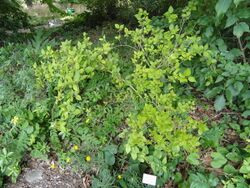Biology:Forsythia europaea
| Forsythia europaea | |
|---|---|

| |
| Scientific classification Error creating thumbnail: Unable to save thumbnail to destination
| |
| Kingdom: | Plantae |
| Clade: | Tracheophytes |
| Clade: | Angiosperms |
| Clade: | Eudicots |
| Clade: | Asterids |
| Order: | Lamiales |
| Family: | Oleaceae |
| Genus: | Forsythia |
| Species: | F. europaea
|
| Binomial name | |
| Forsythia europaea Degen & Bald.
| |
Forsythia europaea, commonly known as Albanian forsythia or European forsythia,[2][3] is a species of flowering plant in the olive family, with a native range from Montenegro to northern Albania.[4] It is the only species of Forsythia native to Europe;[2] prior to its discovery in Albania in 1897, it was thought that all Forsythia were native to East Asia.[5]
Description
F. europaea is a shrub,[6] and can grow up to 10 ft (3 m) tall.[7] Its leaves are 5–8 cm (2.0–3.1 in) in length, and are generally entire (smooth edged).[8] It produces numerous yellow flowers,[5] which are 1.25 in (3.2 cm) in diameter.[7]
Phylogeny
The closest relative of F. europaea is F. giraldiana, a species of Forsythia native to China .[9]
Cultivation
F. europaea was first cultivated in 1899, at Kew Gardens in London, United Kingdom .[7] It is not as widely cultivated as other species of Forsythia as it is not as ornamental,[6] although it is still occasionally grown in parks and gardens.[6][10]
Cultivars produced by hybridisation of F. europaea with F. ovata, a more ornamental species of Forsythia native to Korea,[11] include:
- Forsythia 'Meadowlark', which was developed at North Dakota State University.[12] It produces deep-yellow flowers from its third year onwards,[13] the buds of which are hardy to −35 °F (−37 °C).[14] Its leaves are ivy-green.[13]
- Forsythia 'Northern Sun', which was developed at the University of Minnesota.[12] It grows 10 ft (3 m) tall and 8 ft (2.4 m) wide.[15] Plants produce large, gold-coloured flowers,[15] the buds of which are hardy to −30 °F (−34 °C).[14]
References
- ↑ Shuka, L.; Rivers, M.C. (2017). "Forsythia europaea". https://www.iucnredlist.org/en.
- ↑ 2.0 2.1 "Forsythia europaea (FOSEU)". 2002-02-14. https://gd.eppo.int/taxon/FOSEU.
- ↑ "Forsythia europaea | Albanian forsythia". Royal Horticultural Society. http://www.rhs.org.uk/Plants/7245/Forsythia-europaea/Details.
- ↑ "Forsythia europaea Degen & Bald.". Kew Science. http://powo.science.kew.org/taxon/urn:lsid:ipni.org:names:608888-1.
- ↑ 5.0 5.1 Wilson, Ernest Henry (1930). "For many years". Bulletin of Popular Information (Arnold Arboretum, Harvard University) 4 (3): 12. doi:10.5962/p.322127. ISSN 0196-6057. https://www.jstor.org/stable/42961929.
- ↑ 6.0 6.1 6.2 DeWolf, Gordon P.; Hebb, Robert S. (1971). "The Story of Forsythia". Arnoldia 31 (2): 41–63. ISSN 0004-2633. https://www.jstor.org/stable/42953867.
- ↑ 7.0 7.1 7.2 Wilson, Ernest Henry (1928). "Forsythia europaea". Bulletin of Popular Information (Arnold Arboretum, Harvard University) 2 (1): 4. doi:10.5962/p.321901. ISSN 0196-6057. https://www.jstor.org/stable/42962296.
- ↑ "The Forsythias". Bulletin of Popular Information (Arnold Arboretum, Harvard University). 4 4 (1): 1–8. 2 April 1937. http://arnoldia.arboretum.harvard.edu/pdf/articles/1937-5--the-forsythias.pdf.
- ↑ Kim, Ki-Joong (1999-03-01). "Molecular phylogeny of Forsythia (Oleaceae) based on chloroplast DNA variation" (in en). Plant Systematics and Evolution 218 (1): 113–123. doi:10.1007/BF01087039. ISSN 1615-6110. https://doi.org/10.1007/BF01087039.
- ↑ OLEKSIICHENKO, Nadiia; GATALSKA, Nadiia; MAVKO, Mariana (2018). "The Colour-Forming Components of Park Landscape and the Factors That Influence the Human Perception of the Landscape Colouring". Theoretical and Empirical Researches in Urban Management 13 (2): 38–52. ISSN 2065-3913. https://www.jstor.org/stable/26422068.
- ↑ Anderson, Edgar (1934). "HARDY FORSYTHIAS: With a Short Account of the History of Garden Forsythias and Remarks Regarding Their Possible Future Development". Bulletin of Popular Information (Arnold Arboretum, Harvard University) 2 (3): 9–14. doi:10.5962/p.322249. ISSN 0196-6057. https://www.jstor.org/stable/42962071.
- ↑ 12.0 12.1 Mahr, Susan (18 April 2016). "Forsythia, Forsythia spp.". https://mastergardener.extension.wisc.edu/files/2016/04/Forsythia.pdf.
- ↑ 13.0 13.1 Herman, Dale E.; Evers, Norman P. (1984). "More on Forsythia 'Meadowlark'". Arnoldia 44 (2): 30–31. ISSN 0004-2633. https://www.jstor.org/stable/42954190.
- ↑ 14.0 14.1 "Forsythia x intermedia". https://hvp.osu.edu/pocketgardener/source/description/fo_media.html.
- ↑ 15.0 15.1 "Forsythia 'Northern Sun'". Chicago Botanic Garden. https://www.chicagobotanic.org/plantcollections/plantfinder/forsythia_northern_sun--northern_sun_forsythia.
Wikidata ☰ Q1341548 entry
 |


